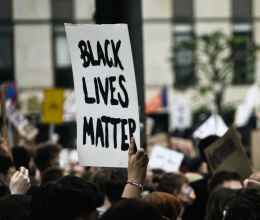
It was on this day in 1967, during the height of the Civil Rights Movement, when two white police pulled over John William Smith, a Black cab driver, after he parked his taxi near their squad car on the side of the road. The officers would go on to drag Smith out of his car, brutally beat him, and then arrest him on charges of assault.
As word spread about the incident, Newark residents took to the streets in what would come to be known as the Newark Rebellion.
The ensuing uprising and police violence lasted for six days, resulting in 26 deaths and thousands of injuries and arrests – overwhelmingly affecting Black community members.
While John Smith’s unjust assault and arrest were the catalysts that set the uprising in motion, the Newark Rebellion was fueled by years of racial disparities in policing and arrests, unequal access to resources and opportunities, and civic disenfranchisement – issues New Jersey still faces.
As it did in the 60s, police misconduct continues to plague the Garden State. And we know from arrest data, and from New Jersey’s status as having the worst-in-the-nation Black-white disparity in its prisons, that the aggressive and unethical operating methods of law enforcement fall most harshly on people of color.
Tangible measures to address racial injustice and police abuse have only recently occurred after decades of advocacy. A 2014 investigation by the U.S. Department of Justice found widespread constitutional violations by the Newark Police Department (NPD), nearly 50 years after Newarkers first called for action in response to the police misconduct. This announcement prompted an agreement between the City of Newark and the Civil Rights Division of the U.S. Department of Justice for federal oversight to preside over sweeping reforms of the NPD.
In 2016, the Department of Justice also signed a consent decree with the NPD to rein in civil rights abuses and Newark put in place a civilian complaint review board (CCRB) with the potential to be one of the strongest in the country.
However, in ruling on a court challenge brought by the police lobby in 2020, the New Jersey Supreme Court placed limits on the powers of Newark’s CCRB – including removing its ability to issue subpoenas and carry out simultaneous investigations. While Newark’s CCRB has continued operating, these restrictions limit its ability to provide comprehensive police accountability.
The actions that have been taken to address police abuses are a step in the right direction, but they are not enough.
And even if Newark’s CCRB was operating with full oversight capacities, the need for police reform remains a statewide issue. Police misconduct is an epidemic across New Jersey, and every community deserves the freedom to create and implement initiatives that have been proven to be effective in fostering safety for the people.
On this anniversary of the Newark Rebellion, the ACLU of New Jersey calls on lawmakers to pass legislation to enable all New Jersey municipalities to establish comprehensive CCRBs with meaningful oversight authority. Strong CCRBs are key to police accountability and promote transparency by fostering relationships between law enforcement and the communities they are sworn to protect and serve.
We further call on lawmakers to pursue data-driven, human-centered policies that invest in communities, rather than criminalize them. Making the legal system more punitive only increases crime statistics – causing irreparable harm within our communities – and deepens this self-perpetuating cycle.
New Jersey has the tools to address police violence, and holding police departments accountable for misconduct when they abuse their power is one measure that will help build a safer future for all New Jerseyans. The legacy of the Newark Rebellion represents the need for racial justice and reform within New Jersey law enforcement to this day and provides an opportunity to reflect on the will of the people to demand a more fair and just society.





